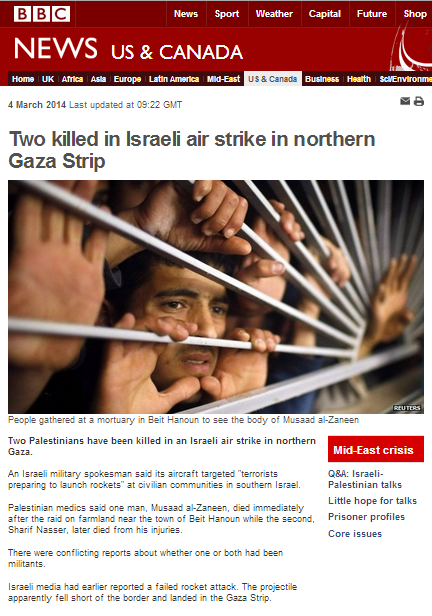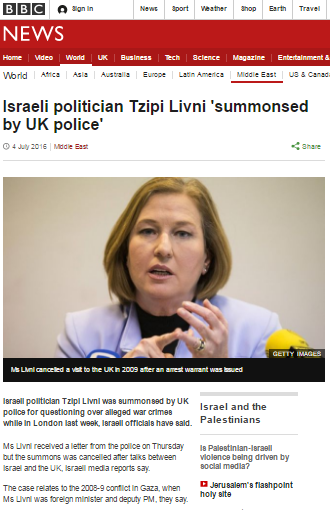On December 7th BBC Four’s ‘Storyville’ series aired a film it titled “The Six-Day War: Censored Voices”.
Readers in the UK can find the programme on iPlayer for a limited period of time here and it can also be viewed here.
Viewers saw the following at the beginning of the film:

That latter statement is of course inaccurate and misleading because Israel “as we know it today” does not include 90% of the land captured during the Six Day War due to the fact that Israel returned the entire Sinai Peninsula to Egyptian control under the terms of the 1979 peace agreement. No mention is made of the Khartoum Declaration and although the film does make use of archive footage to explain Nasser’s blockade of the Straits of Tiran, it is not clarified that the act in itself was a casus belli. Moreover, viewers receive no information concerning the repeated threats of annihilation made by Arab leaders against Israel in the run-up to the war, even though that topic is relevant to the film’s later content.
But the most interesting aspect of the airing of this film by the BBC is the way in which its claims concerning “censored voices” – including in its title – have been promoted and amplified apparently without adequate fact checking.
On the webpage devoted to the film, visitors find the following synopsis:
“Documentary about a long-withheld piece of oral history – a series of tape-recorded interviews conducted with returning Israeli soldiers after Israel’s land gains in the Six-Day War of 1967. Led by the author Amos Oz, a group of kibbutzniks joined together in intimate, taped conversations directly after returning from battlefield.
At the time only a few of these recordings were permitted to gain a public hearing by the Israeli government, but this film reveals them to the public for the first time. The uncensored testimonies suggest that the soldiers were not euphoric about the outcome, but instead were profoundly depressed about what the victory cost.
In this brilliantly-conceived documentary, director Mor Loushy takes the old testimonies recorded by the Israeli soldiers in the immediate aftermath of the war, and plays the recordings back to the now-aged veterans and observes their responses.” [emphasis added]
Those scrolling down the page will find a section in which the director “answers the Storyville Q&A” which includes the following:
“I somehow always search for places that are difficult to get to. The tapes of Censored Voices were hidden for 48 years. It was hard to get them from Avraham Shapira, the editor of the book who initiated the conversations, and then it was hard with the Israeli censorship, but we made it!” [emphasis added]
Near the beginning of the film, viewers see the following:

In other words, BBC audiences are encouraged to believe that they are viewing previously “long-withheld” material subjected to dark Israeli government censorship not once, but twice. But is that actually the case?
As Martin Kramer has documented, Loushy has in fact publicly acknowledged that her own film “was not censored at all”. Regarding the claims of earlier censorship, Kramer’s research shows that the story is nowhere near as simple and straightforward as Loushy and the BBC make out.
“Shortly after the June 1967 war, a book entitled Siaḥ Loḥamim (“Soldiers’ Talk”) appeared. It consisted of transcripts of tape-recorded discussions and interviews involving some 140 officers and soldiers, all kibbutz members. […]
The book struck a chord: Soldiers’ Talk was a phenomenal success, selling some 100,000 copies in Israel, and its kibbutznik editors and participants became minor celebrities, frequently appearing on the lecture circuit and in the media. Its fame also spread abroad: in the words of Elie Wiesel, this was “a very great book, very great,” thanks to “its integrity, its candor. No sleights of hand, no masks, no games. This is the truth, this is how it was.” Eventually the book was translated into a half-dozen languages, most notably in an abridged English version under the title The Seventh Day: Soldiers’ Talk About the Six-Day War. The dialogues even provided fodder for a play performed in New York.”
In other words, the written version of that piece of oral history was not “long withheld” at all. As Kramer reveals, the first edition of the book “was printed privately for circulation in kibbutzim. Clearly marked “internal, not for sale,” and issued between drab covers in October 1967, it didn’t trigger the need for approval by the censor.” Later, as outside interest in the book grew:
“…the editors decided to pursue commercial publication—a step requiring submission of the private edition to the chief military censor, Col. Walter (Avner) Bar-On. There the project became stuck: […] “the chief censor proposed to delete nearly every politically loaded sentence, every sentence describing moral dilemmas such as looting, treatment of prisoners, refugees, etc.”
Had the process ended there, Soldiers’ Talk would have been gutted. But it didn’t end there. In January 1968, the editors contacted the army’s chief education officer, Col. Mordechai (“Morele”) Bar-On (no relation to Walter/Avner Bar-On), and pleaded for his intervention. Impressed by the project, he took it under his wing, asking the chief of staff, Lt. Gen. Yitzhak Rabin, for permission to assume responsibility for all content that didn’t expose military secrets. Rabin agreed, and Mordechai Bar-On became instrumental in seeing the project through censorship. […]
Bar-On, later one of the founders of Peace Now, is still active at eighty-six and takes some pride in the fact that he managed to get Soldiers’ Talk through military censorship with few changes. “I became the spokesperson for the book [in the army],” he recently recalled. “Here and there I softened some sentence, but overall, not much.” […] When I asked him about the claim that the censor had nixed 70 percent of the material, he scoffed: “Maybe two or three percent.””
The clearly misleading claim of “censored voices” is obviously both promotional and political in motivation. Mor Loushy’s political aspirations for her film are not concealed in the Q&A appearing on the webpage or in the film’s promotional material.
“I stand 100% behind my film. I believe in the film and I believe in those voices. I believe that my son, who is two-and-a-half-years-old, needs another future in Israel. I’m fighting for a different future. I’m fighting for a better future – for a future of peace and for a future of two states side by side or any other solution. I don’t want to keep being in this bloody circle. I do believe that democratic states should be transparent in our history. If this film is a part of that, then I’m proud to be a part of that. Truly, I’m not afraid.”
However, BBC audiences who just viewed the film itself on Channel Four without visiting the webpage were given no inkling of the political agenda behind it. Neither were they given any clue as to the problematic presentation of some of the allegations made in the film, as Martin Kramer also notes.
“Footage is shown to illustrate some of the claims—bodies of enemy soldiers strewn along the road, refugees trudging with their possessions on their backs—but it isn’t actual footage of the scenes described by the speaking soldiers, and it bears no identifying captions. We hear voices making confessions or allegations, but we don’t know who is speaking, and the soldiers are identified by name only at the end. (“For the most part,” notes one American reviewer, “the men are treated as interchangeable.”) In these circumstances, the veracity of any individual allegation is difficult if not impossible to establish.”
Only in the fast-moving final credits are viewers informed that “the people shown in the archival footage are not the same individuals speaking on, or described in, the audio tapes created in 1967”.
Those familiar with previous ‘Storyville‘ choices of films relating to Israel (see below) will not have found its decision to broadcast an obviously politically motivated film, gravely lacking in context and purporting to give a platform to “censored voices” that were not in fact censored, surprising in the least.
Related Articles:
BBC Four’s documentary series ‘Storyville’ to show Palestinian propaganda film
BBC commissioning editor ‘explains’ his claim of ‘half-covered-up atrocities’ in Israel





